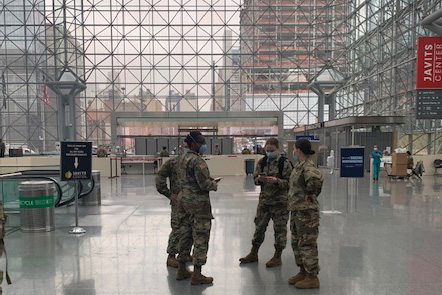Tryphena Lewis was born and raised in Brooklyn, but when she returned to New York City earlier this year, she hardly recognized her hometown.
“Nothing is normal. I came to Manhattan in the middle of the day. There were no cars and no people outside,” she said.
A U.S. Army Reserves colonel and family nurse practitioner, she spent a month caring for COVID-19 patients at a makeshift hospital set up in the Javits Center, a convention center on Manhattan’s West Side.
She usually works at Mercy Hospital Center in Baltimore, Maryland, as a neonatal nurse practitioner. But in March, the U.S. Army gave Col. Lewis 72 hours of notice to put on hold her work, her personal life and her studies as a doctoral student at GW Nursing. After preparatory stops at Ft. Meade in Maryland and Ft. Dix in New Jersey, Col. Lewis arrived in New York City on April 7.
“At first, being here was a little scary,” Col. Lewis said. Her family and friends were concerned, given how much media attention the Javits Center and COVID-19 crisis in New York City has received, she said via telephone from the Javits Center.
But she has access to plenty of personal protective equipment (PPE) and feels safe given how the field hospital is arranged. “Now, I feel like the grocery store is scarier to me than what I’m doing here at the Javits Center,” she said.
COVID-19 patients from hospitals all over the city are transferred to the Javits Center; staff at the field hospital continue the care patients were receiving. The field hospital is arranged into pods, including areas for critical care and isolation. Col. Lewis is responsible for the nurses working on her assigned pod, which would care for up to 20 patients at a time.
“The most amazing thing was that in one room we have every single discipline you could ever need. When I needed a social worker to help a patient, all I needed to do was look at the list and text them; they took care of it right away,” Col. Lewis said.
Though the Army had well-equipped personnel, nothing could prepare them for this pandemic.
“Nothing could prepare us ahead of time for this. We had to learn on the job. Obviously, nobody knew anything about coronavirus,” she said. Providers had to keep a close eye on patients’ mental status and oxygen levels. They also had to monitor updates from the Centers for Disease Control and the medical community about new COVID-19 information, including patients’ reactions to drug cocktails.
The Javits Center field hospital is closing this week. Col. Lewis isn’t sure where she’ll go next. After a stop to regroup, she may be deployed to another hot spot, and she will definitely be quarantined before her release home. Col. Lewis is part of an unprecedented deployment of military medical personnel stateside.
Whatever is in store, “the most challenging thing is being uncomfortable and just being flexible. We had to change things as we learned more about the virus, we have to be ready to go where we’re needed” she said. “We’re writing it as we go.”
Please consider honoring the work that nurses do each day by making a gift to support GW Nursing scholarships. Your gift today will support a student entering our accelerated B.S.N. program this fall.


